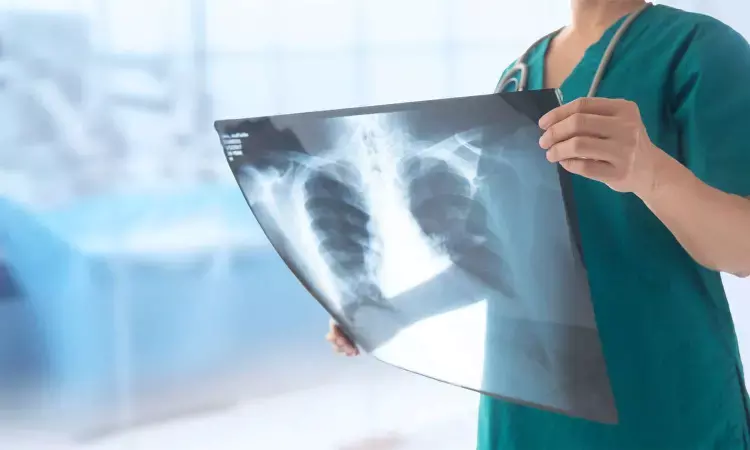- Home
- Medical news & Guidelines
- Anesthesiology
- Cardiology and CTVS
- Critical Care
- Dentistry
- Dermatology
- Diabetes and Endocrinology
- ENT
- Gastroenterology
- Medicine
- Nephrology
- Neurology
- Obstretics-Gynaecology
- Oncology
- Ophthalmology
- Orthopaedics
- Pediatrics-Neonatology
- Psychiatry
- Pulmonology
- Radiology
- Surgery
- Urology
- Laboratory Medicine
- Diet
- Nursing
- Paramedical
- Physiotherapy
- Health news
- Fact Check
- Bone Health Fact Check
- Brain Health Fact Check
- Cancer Related Fact Check
- Child Care Fact Check
- Dental and oral health fact check
- Diabetes and metabolic health fact check
- Diet and Nutrition Fact Check
- Eye and ENT Care Fact Check
- Fitness fact check
- Gut health fact check
- Heart health fact check
- Kidney health fact check
- Medical education fact check
- Men's health fact check
- Respiratory fact check
- Skin and hair care fact check
- Vaccine and Immunization fact check
- Women's health fact check
- AYUSH
- State News
- Andaman and Nicobar Islands
- Andhra Pradesh
- Arunachal Pradesh
- Assam
- Bihar
- Chandigarh
- Chattisgarh
- Dadra and Nagar Haveli
- Daman and Diu
- Delhi
- Goa
- Gujarat
- Haryana
- Himachal Pradesh
- Jammu & Kashmir
- Jharkhand
- Karnataka
- Kerala
- Ladakh
- Lakshadweep
- Madhya Pradesh
- Maharashtra
- Manipur
- Meghalaya
- Mizoram
- Nagaland
- Odisha
- Puducherry
- Punjab
- Rajasthan
- Sikkim
- Tamil Nadu
- Telangana
- Tripura
- Uttar Pradesh
- Uttrakhand
- West Bengal
- Medical Education
- Industry
Incense Burning Impairs Lung Function in Male Patients with Diabetes: Study

A recent study published in the Nature Scientific Reports uncovered a concerning association between indoor incense burning and impaired lung function in individuals with diabetes. This research was conducted among 431 Chinese adults diagnosed with diabetes which highlights the potential risks posed by indoor environmental factors on respiratory health in this vulnerable population.
The study explored the little-known relationship between incense burning and lung health in diabetic individuals. This research collected detailed data on incense burning practices and the characteristics of participants using a structured questionnaire. Impaired lung function was the primary outcome of this study, which was evaluated through spirometry, a diagnostic test that measures airflow and respiratory capacity.
The key findings revealed that participants exposed to indoor incense burning had 130% higher odds of impaired lung function when compared to those not exposed. This heightened risk, represented by an odds ratio (OR) of 2.3 (95% confidence interval [CI]: 0.97–5.16), approached statistical significance with a P-value of 0.05. However, when the data was analyzed further, significant gender differences emerged.
In men, the link between incense exposure and impaired lung function was pronounced and statistically significant. The male participants exposed to incense burning were found to have 239% higher odds of impaired lung function (OR = 3.39; 95%CI: 1.07–9.82; P = 0.03) when compared to their non-exposed counterparts. Also, the association was not significant in women which suggests possible biological or behavioral differences warranting further exploration.
These results are significant as they account for demographic and lifestyle factors, pointing to indoor environmental exposures like incense burning as critical yet often overlooked contributors to respiratory health challenges in diabetic patients. With diabetes already a major risk factor for various health complications, these findings stress the need for targeted public health interventions.
This research emphasized the importance of raising awareness about the risks associated with frequent incense burning in indoor spaces. Given its cultural and religious significance in many communities, practical strategies to reduce exposure (improving ventilation or reducing burning frequency) could help minimize health risks. Overall, this study adds to the growing body of evidence linking incense burning to respiratory health issues and calls for further studies to confirm findings and explore underlying mechanisms.
Source:
Meng, Y., Han, X., Yi, C., Liu, M., Chen, R., Chen, H., Zhou, T., Liu, J., Chen, X., & Zhan, Y. (2025). Indoor incense burning and impaired lung function in patients with diabetes. In Scientific Reports (Vol. 15, Issue 1). Springer Science and Business Media LLC. https://doi.org/10.1038/s41598-024-84565-z
Neuroscience Masters graduate
Jacinthlyn Sylvia, a Neuroscience Master's graduate from Chennai has worked extensively in deciphering the neurobiology of cognition and motor control in aging. She also has spread-out exposure to Neurosurgery from her Bachelor’s. She is currently involved in active Neuro-Oncology research. She is an upcoming neuroscientist with a fiery passion for writing. Her news cover at Medical Dialogues feature recent discoveries and updates from the healthcare and biomedical research fields. She can be reached at editorial@medicaldialogues.in
Dr Kamal Kant Kohli-MBBS, DTCD- a chest specialist with more than 30 years of practice and a flair for writing clinical articles, Dr Kamal Kant Kohli joined Medical Dialogues as a Chief Editor of Medical News. Besides writing articles, as an editor, he proofreads and verifies all the medical content published on Medical Dialogues including those coming from journals, studies,medical conferences,guidelines etc. Email: drkohli@medicaldialogues.in. Contact no. 011-43720751


